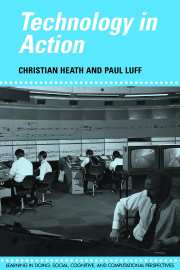Book contents
- Frontmatter
- Contents
- Preface
- 1 Technology and social action
- 2 Documents and professional practice: ‘bad’ organisational reasons for ‘good’ clinical records
- 3 Animating texts: the collaborative production of news stories
- 4 Team work: collaboration and control in London Underground line control rooms
- 5 The collaborative production of computer commands
- 6 ‘Interaction’ with computers in architecture
- 7 Reconfiguring the work space: media space and collaborative work
- 8 Organisational interaction and technological design
- References
- Index
2 - Documents and professional practice: ‘bad’ organisational reasons for ‘good’ clinical records
Published online by Cambridge University Press: 22 September 2009
- Frontmatter
- Contents
- Preface
- 1 Technology and social action
- 2 Documents and professional practice: ‘bad’ organisational reasons for ‘good’ clinical records
- 3 Animating texts: the collaborative production of news stories
- 4 Team work: collaboration and control in London Underground line control rooms
- 5 The collaborative production of computer commands
- 6 ‘Interaction’ with computers in architecture
- 7 Reconfiguring the work space: media space and collaborative work
- 8 Organisational interaction and technological design
- References
- Index
Summary
It is a feature of the human predicament that we labour under two connected handicaps whenever we seek to regulate, unambiguously and in advance, some sphere of conduct by means of general standards to be used without further official direction on particular occasions. The first handicap is our relative ignorance of fact: the second is our relative indeterminacy of aim. If the world we live in was characterised only by a finite number of features, and these together with all the modes in which they could combine were known to us, then provision could be made in advance for every possibility … Everything could be known, and for everything, since it could be known, something could be done and specified in advance by the rule. This would be a world fit for ‘mechanical’ jurisprudence.
Plainly this world is not our world.
Hart (1961: 125)Introduction
As Weber pointed out in his classic theory of bureaucracy, files and documents are an essential part of the modern organisation, in both the public sector and the ‘advanced institutions of capitalism’. The modern medical organisation is no exception. Both time and money are devoted to documenting information concerning the activities of organisational personnel, especially in their dealings with the general public and, more particularly, patients. Perhaps the most important of these files and documents is the medical record.
- Type
- Chapter
- Information
- Technology in Action , pp. 31 - 60Publisher: Cambridge University PressPrint publication year: 2000
- 10
- Cited by



